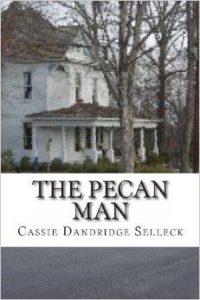 Longtime WAG member Cassie Selleck is known for her award-winning novel The Pecan Man. Originally self-published in 2012, Cassie’s tale of murder and fraught racial relations in a small Southern town captured the attention of readers along with critical praise. With The Pecan Man now being made into a film, Cassie shares of the highlights of her novel’s continuing journey from the page to the screen.
Longtime WAG member Cassie Selleck is known for her award-winning novel The Pecan Man. Originally self-published in 2012, Cassie’s tale of murder and fraught racial relations in a small Southern town captured the attention of readers along with critical praise. With The Pecan Man now being made into a film, Cassie shares of the highlights of her novel’s continuing journey from the page to the screen.
Q: Who first contacted you about making a movie from The Pecan Man, and how did they find you?
A: The film company, BCDF Pictures, actually has a producer whose job is to look for books to adapt to film. He said he often searched Amazon for certain keywords and to scan the reviews, and my book kept coming up. Eventually he read it and immediately felt it would be perfect to adapt to film. He easily found my email address through my blog/website and contacted me through email. I forwarded the email to my agent, and she took it from there. (By the way, my agent found me through Amazon as well.)
Q: Are you involved in writing the screenplay? How different is it from your book, and did you have any say in how the book was adapted?
I am only involved in that the film company’s owner has a very generous spirit and wants me to be happy with the project. He asked in our first meeting if I would be available to review the screenplay and make comments and, of course, I agreed. I actually got to see the fourth draft, made copious notes, and then recently saw the changes that were made after my notes.
Q: If there were any substantial changes to the book, how did you react to them?
Good question. At first, despite the screenwriter being wonderful, there were a few things that I felt like were not portrayed as I wrote them and, as I said, I made quite a few notes and sent them along. Honestly, it’s kind of easy to freak out a little because you lose so much control over the end product. But again, the people who are working on it have been great and the last draft I read was very close to perfect. We’ll see who ends up triumphant over the last little thing we’re still discussing, but despite changes that had to be made for compression’s sake, I’m super happy with how it’s going.
Q: Can you share the details of the movie—who’s directing and producing it, who’s playing the major characters, and when it is expected to be released?
I wish I knew these things, but I don’t. They are currently searching for a director and are talking with several major stars about the available roles. I know that they are definitely moving forward at a steady pace.
Q: What advice would you give other writers wanting to adapt their novels for film?
First, tell a compelling story. I happened to write a story that is relevant to current social issues, and this particular company was looking for books with a social message. There are many genres of film being made today by countless companies; the trick is to find them or help them find you.
Many people ask if they should try to write their own screenplay. As much as I am a proponent of independent publishing, I feel like it is crucial to have an experienced screenwriter if you want to go that route, especially with an adaptation of a novel.
I would suggest learning how to pitch your concept and how to find a company that is looking for what you write. Then send a pitch, or even just a copy of your book. You never know whose hands might pick it up. This company found me, so I didn’t have to do these things, but I do know it is possible. Lastly, understand that there is, as my mother used to say, “more than one way to skin a rabbit.” Be willing to do the work. Research film companies and what their procedures are.
What I would not do is ask writers with movie deals to help you get one. We just don’t have that kind of pull, or even the knowledge. Every company is looking for something different. More than anything else, write a good story and get it out there where it can be found.
